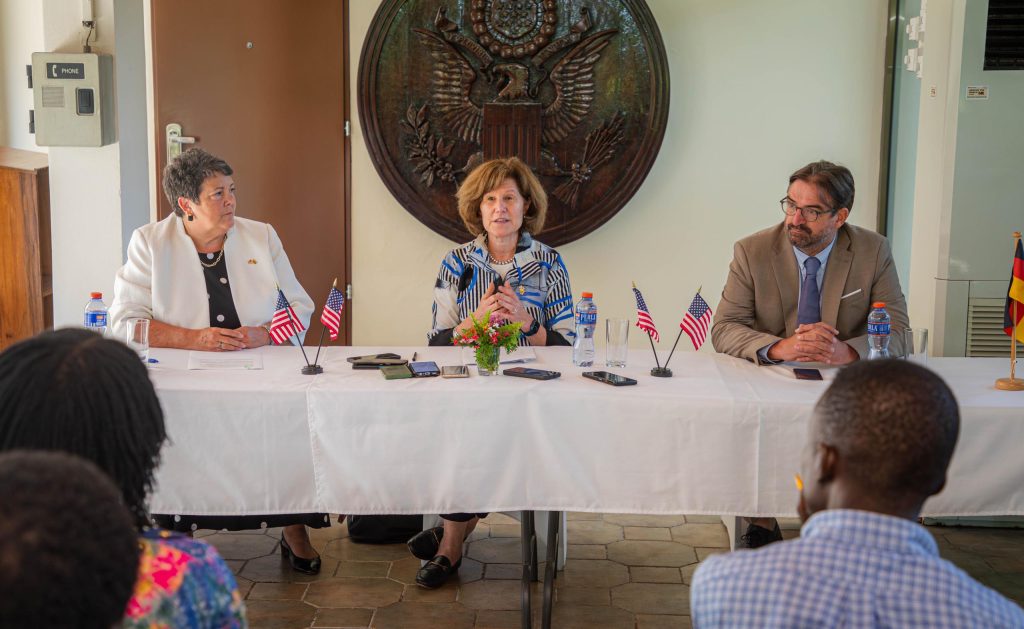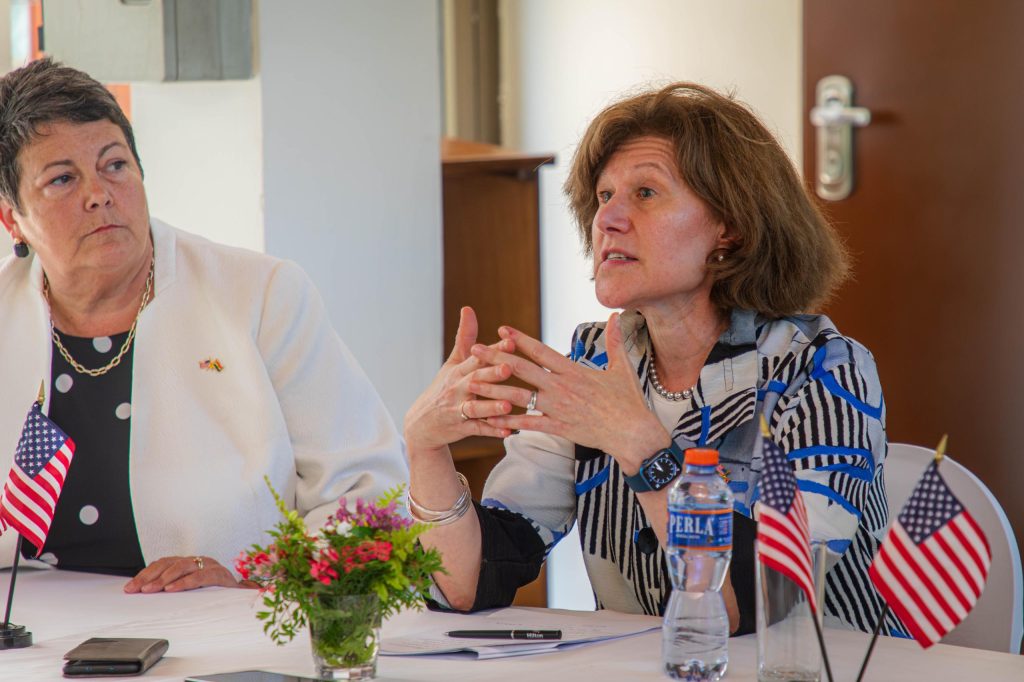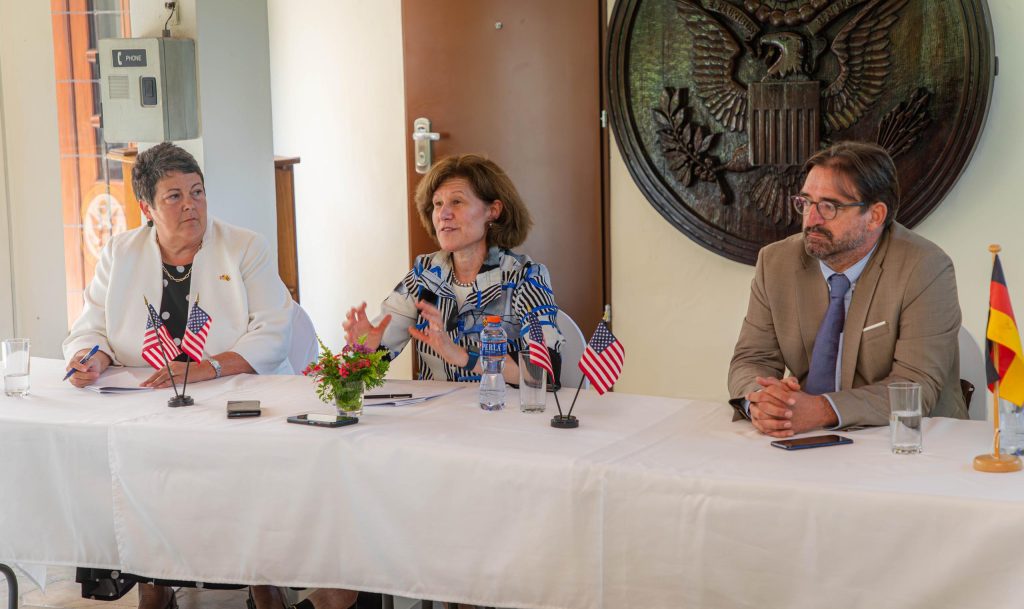By James Amoh Junior, GNA
Accra, Oct. 12, GNA – The United States and Germany have launched a $40 million Coastal States Stability Mechanism (CSSM) regional initiative to strengthen stability in northern Ghana and the coastal West African countries of Benin and Togo.
As a multi-year joint U.S.-Germany conflict prevention initiative, the CSSM works with government counterparts and local communities to strengthen the state’s presence and its relationship with local communities.
The CSSM project is funded by the United States Agency for International Development (USAID) and the German Federal Foreign Office (GFFO) and is being piloted from April 2023 to April 2026.
It will be implemented in partnership with the International Organisation for Migration (IOM) in coordination with Ghana’s Ministry of National Security and its Counter-Terrorism Fusion Centre local government institutions and community partners.
It aims to reinforce security, promote community cohesion, improve the capacity and legitimacy of government representatives and services, and advance social and economic development.
The CSSM aligns with Ghana’s National Framework for the Prevention and Countering of Violent Extremism and Terrorism and recognizes that a community-oriented approach is required to address key drivers of instability and to mitigate the spread of Violent Extremist Organizations (VEOs).
Using a flexible small-grants mechanism to implement activities tailored to the local context, the CSSM intends to support government action to address localized drivers of instability by expanding and improving the delivery of critical services and supporting community efforts to improve social and economic conditions.
Launched jointly in Yendi, Northern Region, by U.S. Assistant Secretary of State for Conflict and Stabilization Operations Anne Witkowsky and German Director General for Crisis Prevention, Stabilization, Peacebuilding and Humanitarian Assistance, Deike Potzel, the initiative will reinforce civilian security provision in areas under threat of violent extremism.

As part of the project launch, some essential equipment were donated to the Chereponi District Hospital and the District Police Service, whose police station is currently being rehabilitated as part of the programme.
This initial effort will fund the installation of 50 solar streetlights in the Wenchiki and Dambu communities, personal protective equipment for the Police Service, a backup solar power system and blood bank refrigerators for the district’s only hospital.
It will also fund a trauma counselling and a Peace Durbar for community stakeholders, and high school debate and quiz competitions centred on peacebuilding, conflict resolution, and ethnic diversity.
Beyond the initial focus on Chereponi, the CSSM programme will expand to select districts in the Upper West and Upper East Regions with programmes and support designed for the needs of those communities.
Ms Anne Witkowsky, U.S. Assistant Secretary of State for Conflict and Stabilization Operations, speaking at a press briefing in Accra after the launch, said the CSSM project marked an important step forward in its partnership with Ghana as they worked together to enhance resilience and security across coastal West Africa in the face of regional threats.
Ghana, she said, stood out as a leader in the region and the “United States is proud to support the country’s security efforts.”
She noted that the CSSM was part of a broader U.S. Strategy to Prevent Conflict and Promote Stability (SPCPS) in coastal West Africa and beyond.

She reiterated that through the strategy, the U.S. was seeking to enhance social cohesion, improve government responsiveness and support security.
“Through these initiatives, we aim to create lasting impacts that contribute to a more secure and resilient Ghana and the region. When Africa succeeds, the world succeeds,” U.S. Assistant Secretary Witkowsky emphasized.
She further emphasized the importance of CSSM and the broader U.S. commitment to promoting stability and preventing violent extremism in West Africa.
Ms Witkowsky further underscored, “Through CSSM, we are pursuing an integrated approach to development and security, aligning our efforts with the plans of our partner governments. This holistic approach helps mitigate conflict risks, reduce vulnerabilities, and strengthen social cohesion.”
Mr Daniel Krull, German Ambassador to Ghana, who applauded the trilateral relation between the U.S., Germany and Ghana said, “Ghana was a beacon of democracy and is very close to our hearts and we are very much interested in the success of the democracy in Ghana.”
On Ghana’s upcoming general elections, Mr Krull expressed optimism of a free and fair election, and that “we look with concern on neighbouring states and what impact that might have on security in Ghana”.

That, he stated, was why it was important to work together to enhance resilience, and that the CSSM Project was one of many activities Germany and the U.S. were conducting in Ghana.
Ambassador Krull said Germany’s development portfolio in Ghana amounted to more than $700 million, particularly in the North West Region, where it supports the local development fund and agriculture to build resilience.
Madam Virginia Palmer, U.S. Ambassador to Ghana, also underscored the need to combat violent extremism holistically with diplomacy, defence and development.
She was hopeful that with the long-standing security relations between Ghana and the U.S. some progress could be made in nipping violent extremism in the bud.
She said a recent visit to the U.S., by a Ghanaian security delegation, was a way of demonstrating that Ghana was foundational for the United States in West Africa, a democratic model and exporter of security.
GNA